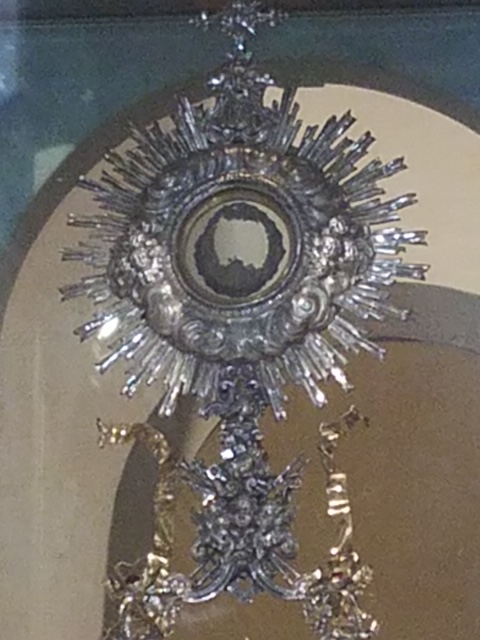Is. 35:4-7a; Ps. 146:7-10; James. 2:1-5; Mk. 7:31-37
“Ephphatha! Be opened! Be opened to Jesus who does all things well. “Here is your God, he comes with vindication; with divine recompense he comes to save you.” We live in times when the hearts of many are frightened from all the signs of threat to life. The threat of a virus that continues to mutate and survive to strike again, the threat of nature’s storms that leave communities devastated, the threat of a culture of death from ideologies that promote death by abortion, death by euthanasia, death by weapons of mass destruction, death by torture and most prevalent is death by acts of mortal sin. The Lord reminds us this day to “Be strong, fear not!” Fear is from the evil one but the “Lord sets captives free.”
What fear do we bring to the Lord this day? What is holding us back from the love and mercy of God afraid to let go and let God? Is our heart frightened from an illness, an addiction, or a sin that has us captive? Do we fear not for ourselves but for someone we love who is being held captive, blind by a culture of death, living in sin and deaf to the truth of God’s love and mercy? Who do we need to bring to the Lord this day, our sons and daughters, husband or wife, ourselves? We can bring ourselves to be opened to his healing love. We can also bring our loved ones through our prayers to God to be rescued and saved from the darkness. The prophesy of Isaiah is fulfilled today in the gospel by Jesus. Jesus is the one we turn to who gives us the “springs of (living) water” and call us to be opened to receive his grace.
St. Monica prayed for her son for years and divine providence guided her to the bishop of Milan, St. Ambrose and it was through St. Ambrose that St. Augustine was converted from a life of sin to a journey towards sainthood. That is the power of prayer to those who love him. God is open to us, to our prayers and to our salvation and he can open our souls to his healing power. Be opened! God “choose those who are poor in the world to be rich in faith and heirs to the kingdom”. God recognizes the poor who have so little are open to receive much because by their poverty they come to trust more and see the hand of God meeting their needs no matter how small or how important their need, God works in their life and their love grows with each answered prayer. The poor who trust in God hold a treasure chest of answered prayers for their faithfulness to “pray, trust and don’t worry” as Padre Pio would say.
If God looks into our spiritual treasure chest within our souls, what will he find? He will be seeking songs of praise and worship, prayers of thanksgiving, Holy Masses offered for our deceased loved ones, sacrifices of penance, fasting, and abstinence, and acts of charity for the poor. When we look into our treasure chest what do we see that God is already aware of? Is it filled with worldly treasures and we have to dig deep to find an act of charity? Spiritual treasures rise to heaven and give God glory while earthly treasures become lost, buried, or forgotten. The God of our salvation desires the treasure of our souls adorned with acts of love, mercy, and charity and it all begins with being opened to receive him first.
Will our souls be opened to receive him and will he see in us the image of his body and blood surrendering to the will of God? Be opened to receive the graces that arm us for this world and the grace to carry the cross for our salvation. God seeks shepherds and warriors not wannabes but doers of his word. Let our souls be opened by giving praise to the Lord. “Praise the Lord, my soul” to be opened to love, mercy, and healing. When we praise God, we are already being opened to receive his “divine recompense” and to live by his divine will.
Salvation comes with healing and it is a miracle that we are here this day and not among the walking dead from sin or six feet under buried by the storms of life. We have already risen by our baptism to salvation to give praise to God with eyes opened to the light, ears opened to the truth, and hearts flowing with streams of living water to satisfy the thirsty soul that longs for God. When we remain in him, we rise each day to our Easter time to give thanks for the glory of God that resides in us. Fear not and praise much to be strengthened in moments of weakness that we may not fall into despair.
I ask myself why did Jesus touch the deaf man with a speech impediment. He touched his ears and with spit touch his tongue. Would we allow someone to touch us this way? Probably not unless we had much faith in the one who is present to us. Jesus has the power of the word to simply say and it shall be done and we will be healed. Yet, Jesus is using God’s creation of nature sanctifying both the nature of elements from where our nature comes from and sanctifying us as he heals us. Jesus comes to make all things new in God’s call to perfection from the beginning of creation. He desires for us to return to his perfection and promises to do so in the resurrection of the body.
If we think of the sacraments, we recognize that each sacrament has a visible sign of the invisible grace being received. There is water for baptism, bread and wine for the Eucharist, oil for healing, baptism, and confirmation. Jesus is there present to us in the sacrament calling us to be opened to receive him. Now imagine what will God do with our brokenness in the resurrected body to come? He will make all things new raising our humanity to his divinity.
Jesus shares by his humanity our suffering and he carries the burden of our suffering and our sins in his body in perpetual atonement for you and I. Now is the time for healing, now is the time for repentance, now is the moment to be opened for conversion and renewal. What is holding us back? What is our fear? Underlying all our fears is sin, the sin of pride, the sin of disobedience, the sin of disbelief.
The sin of pride says I believe but I am not ready to humble myself. In St. Augustine’s Confessions he recounts his prayer, “Lord, make me chaste, but not yet.” Are we still holding back saying “Lord, not yet”? We all carry the desire to say, “I want”. “I want control of my life. I want more…I want it my way”. It begins in our childhood when we begin to say “no”, no to our parents, no to rules, no to authorities, and no to the God of our parents. We close our ears to truth for the lies we want to believe. Lies like “I thought I didn’t need anybody.” We become mute to the name of God refusing to even speak of God in our lives that is until something bad happens and we are humbled by the reality of our nothingness without God. Now is the time to be opened and to speak “God be with us”. Now is the time to ask, “God what is your will for me?”
The sin of disobedience because we do not trust. Our trust issues say, “I don’t trust an institution of religion there to keep people oppressed”. We have all heard it said, “the church is full of hypocrites” then come join your people and be among your own kind. Be opened to what it is to be “church” that is one body of believers supporting the gift of God’s freedom, love and mercy. Without God we are oppressed by all the sins of this world and only he can set us free of bondage. God calls us to be “one” united in faith belonging to the one body of Christ. Look beyond our sinfulness as broken and fallen sinners to trust in his divine providence for the One Holy, Catholic and Apostolic Church.
Then there is the sin of disbelief when our eyes see all that is wrong and evil in this world. We hear it said, “How can a God who is all powerful and knowing allow so much evil in this world? I cannot accept that kind of God.” That kind of God has set us free to make our choice and face our consequences. Those who choose to be among the ones who reject him are the source of so much evil in this world and the consequence is eternal death. Those who choose to be united to God are the source of what is truth, good, beauty and unity in this world and the reward is eternal life. Believe and be opened to see the hand of God working to bring us all to receive salvation.
What is left if we have no God, we have no life within us. Without God life is a tragedy of survival waiting for death to happen. Those who live this life keep asking, “How am I going to live and make it? Why am I here? What is going to happen to me?” With God life is a drama of discovery where we don’t ask ourselves the how, why, or what but we turn to God to seek, to search and to find for ourselves his glory through humility, obedience, and faith. Then the God of revelation will reveal to us the mystery of our purpose and call into this life and we shall be healed of our sins and infirmities.
He is our God and we are his people opened to receive the glory of his revelation in us, with us, and through us. Then we will be ready to go forth and proclaim his gospel message and the story of salvation as witnesses to what God is doing in our lives. Be opened, be strong, fear not and love much! Ephphatha!
Tags











Recent Comments